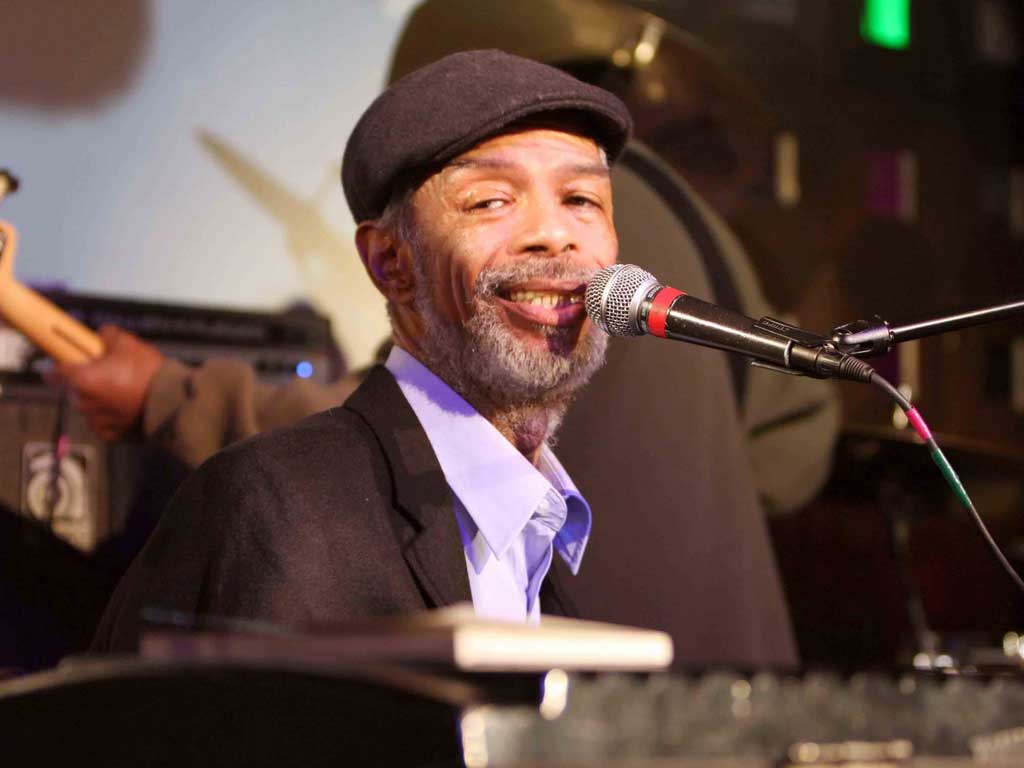
Your support helps us to tell the story
From reproductive rights to climate change to Big Tech, The Independent is on the ground when the story is developing. Whether it's investigating the financials of Elon Musk's pro-Trump PAC or producing our latest documentary, 'The A Word', which shines a light on the American women fighting for reproductive rights, we know how important it is to parse out the facts from the messaging.
At such a critical moment in US history, we need reporters on the ground. Your donation allows us to keep sending journalists to speak to both sides of the story.
The Independent is trusted by Americans across the entire political spectrum. And unlike many other quality news outlets, we choose not to lock Americans out of our reporting and analysis with paywalls. We believe quality journalism should be available to everyone, paid for by those who can afford it.
Your support makes all the difference.The only time I saw the late Gil Scott-Heron perform was in a New York nightclub in 2001. I had huge expectations of this iconic, radical, spoken-word artist and musician whose jazz-funk syncopations and uncompromising lyrics spawned generations of imitators. But it was already too late to see the great man as he once was. He would soon be busted for the drug addiction that led to two spells in prison. That night, his crack-ravaged performance was so bad, the audience talked over him.
The Last Holiday is his posthumously-published memoir and it begins well, with moments of drama, insight and clarity. He was born in Chicago in 1949; his father, Gil Heron, was a Jamaican footballer who abandoned his 18-month-old son to become the first black player for Celtic in Scotland. His mother, Bobbie, a college graduate, arranged for him to be raised by his grandmother, Lily, in segregated Tennessee.
Lily was a tiny, outspoken washerwoman who fearlessly challenged the colour bar, and was clearly the primary influence for his own lifelong stance against injustice. When she died, he relocated to New York to join his hitherto peripatetic mother who had settled in the city. An avid reader and writer of stories, he eventually earned a scholarship to the prestigious, private Fieldeston School in the Bronx.
Scott-Heron was a prodigious talent who flourished perhaps prematurely. After school he attended Lincoln University but dropped out to pursue writing. His most famous poem, The Revolution Will Not Be Televised, was, astonishingly, written when he was only 19. By 23 he had already released three albums with Arista Records and had two novels and a volume of poetry published. By the mid-Seventies he was a cult figure, although you wouldn't know it from this memoir. It is a lesson in modesty and generosity towards other artists, notably Stevie Wonder, with whom he toured in 1981 to campaign for a Martin Luther King annual holiday. In later years he became known as the Godfather of Rap, a tag he resented, saying "I don't know if I can take the blame for it."
In early chapters he writes with such stylish exuberance and conversational ease that massive overdoses of alliteration can be forgiven. (His grandmother is "predictable, patient, perceptive, persistent, proud, private and practical".) He creates some memorable scenes, such as his formidable mother's triumph over the disciplinary committee at school. But later sections read like the disjointed recollections of someone who can't think straight. There are many frustrating gaps in the storytelling, albeit explained by the publisher's postscript: this memoir has been pieced together from fragments of his writings stretching back to the 1990s. Unfortunately, it shows.
It seems that the socially-conscious wordsmith just couldn't get personal. Instead of self-reflection, in later chapters there is too much withholding for a satisfying memoir. Until, that is, the final chapter when there is such an unexpected torrent of grief and pain, it is heartrending. "I was repulsed by my lifelong insistence of fucking isolation... I am honestly not sure how capable I am of love". Of his children, he writes, "I hope there is no doubt that I loved them and their mothers as best I could. And if that was inevitably inadequate, I hope it was supplemented by their mothers, who were all better off without me." If a biography is not in the pipeline, it needs to be.
Bernardine Evaristo's 'Blonde Roots' is published by Penguin
Join our commenting forum
Join thought-provoking conversations, follow other Independent readers and see their replies
Comments